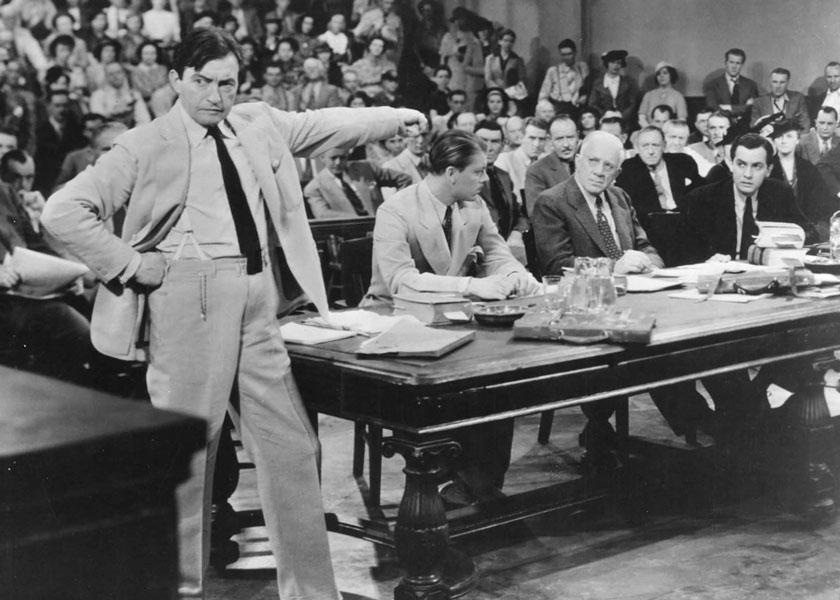Synopsis
The 1937 film They Won't Forget opens on a group of elderly men dressed as soldiers. It is Confederate Memorial Day and they are about to march in a parade. One, reflecting on their dwindling numbers, predicts that they and their cause will soon be forgotten. This allows the group leader (Harry Davenport) to declare: “They won't forget. They won't never forget!”, presumably justifying the film's title. In fact the title is meaningless in the context of the movie's actual story, which begins with the next scene.
The scene is a town in the South. We join a class in session at a small private business college. The instructor, Hale, is a handsome but serious and bespectacled young man. He is giving shorthand dictation to a group of young women, one of whom, Mary Clay, obviously has a crush on him. Mary is played by the sixteen year old Lana Turner. Suddenly the president of the college bursts into the room and chides Hale (Edward Norris) for holding class on Memorial Day. Hale's ignorance leads to a dressing down from his boss. The class is suitably amused at their instructor's embarrassment, and enjoy a good laugh at his expense. For Hale is an outsider of the worst kind: a Northerner…a Yankee… possibly even a Jew. Hale's face registers anger and resentment. We learn later that he only accepted the job as a last resort and longs to escape the oppressive atmosphere of the southern town and return to his northern homeland.
Having forgotten her vanity (makeup kit), Mary returns to the now deserted college classroom to retrieve it. Later that evening her dead body is found in the building; she has been murdered. Suspicion focuses on the Black janitor, who has discovered her body and called the police. He hysterically professes his innocence.
Enter District Attorney Andy Griffin, played by British actor Claude Rains. Rains's Southern accent is a bit shaky, but his powerhouse performance kicks the film into high gear. Griffin is politically ambitious and is looking for a break that will win him a Senate seat. This is it! He allows he could easily get a conviction against the janitor, but he is after bigger fish. He figures bagging the Yankee outsider would bring him the most political capital. Hale is, indeed, a valid suspect, along with the janitor, Mary's boyfriend (Elisha Cook Jr.), and even the president of the college.
Hale is arrested and put on trial, although the evidence against him is purely circumstantial. The skills of his slick lawyer (Otto Kruger), paid for by Northern sympathizers, are of no use given the prejudices of the jurors. Hale's doom is sealed when Griffin goes full demagogue, giving an impassioned and inflammatory closing argument, proclaiming the defendant's guilt. He is of course found guilty, and sentenced to death. The governor, feeling that the evidence against Hale is flimsy at best, commutes his sentence to life in prison, even though he knows it will end his own political career.
The train carrying Hale to the penitentiary is hijacked by a mob of townsmen, who drag him away to be lynched, bringing his ordeal to a tragic end.
In a postscript we see the District Attorney in his office,
admiring a
Griffin For Senate
poster held by his new henchman, sleazy newspaperman Bill
Brock, wonderfully portrayed by Allyn Joslyn in his first
screen appearance. Griffin is apparently the front runner in
the race. They are accosted by Hale's widow, nicely
played by obscure actress Gloria Dickson, who condemns them as
being responsible for her husband's death. She also
returns a check Griffin has given her, obviously guilt money.
As the film ends Griffin and Brock watch her going down the
steps of the courthouse, both wondering out loud if her
husband really did it, thus giving the film a hard, cynical
ending worthy of the best Warners Pre-Code opus.
Discussion
The opening minutes of the film are a bit puzzling, starting
with the credits, which look like they have been eroded from
mesa-like rock formations. This visual effect seems more
appropriate for a Western than a serious drama. The musical
background consists of a rather bubbly medley of tunes
associated with the Old South, e.g.
Dixie,
My Old Kentucky Home,
Swanee River,
and
The Year Of Jubilo.
In the early 1930's Warner Brothers studio was noted for gritty, fast-paced, hard-hitting urban crime films, including such classics as Little Caesar (1931), Five Star Final (1931), Two Seconds (1932), and I Am A Fugitive From a Chain Gang (1932). After mid-1934, with stricter enforcement of the Production Code, Warners moved away from this type of film, focusing on Paul Muni biopics, Errol Flynn swashbucklers, and weepies with Bette Davis or Kay Francis .
They Won't Forget (1937) is a throwback to the social realism of Warner's earlier, Pre-Code films. It was directed by Mervyn LeRoy as were, incidentally, the four films mentioned above. LeRoy had an interesting career. While never reaching the very top of the Hollywood directorial ranks, he worked steadily from the late silent era into the 1960's. He later turned to producing other men's films, most notably The Wizard Of Oz (1939). His best work as a director was probably done in the early 1930's, before the restrictions of the Code stifled creativity. This was true of many other Hollywood directors.

